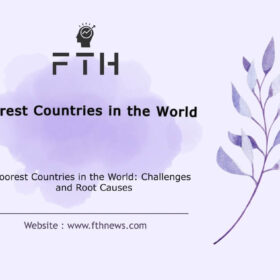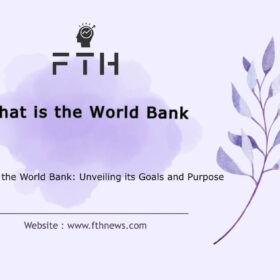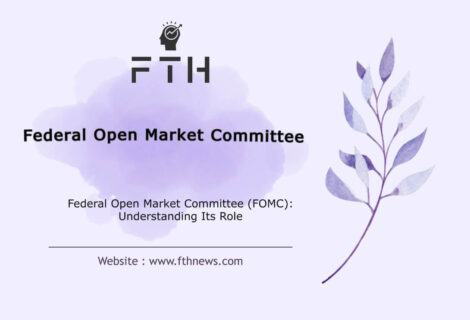
Richest Countries in the World and the Interplay with Happiness
Richest Countries in the World: In the intricate tapestry of global economics, measuring a country’s wealth stands as a pivotal task, with Gross Domestic Product (GDP) and Gross National Income (GNI) serving as key metrics. These measures encapsulate the total value of goods and services produced within a country’s borders, providing a lens through which we can gauge economic prowess. However, delving into the intricacies of this assessment reveals a multifaceted landscape, where the complexities of wealth distribution within countries come to the fore.
While GDP quantifies the sum of all economic activities within a nation, it becomes apparent that this metric alone may not paint a complete picture. Enter GNI, a reliable companion in this economic narrative, assessing a country’s real wealth by considering not only its domestic production but also accounting for income earned abroad. Together, GDP and GNI form a dynamic duo, shedding light on the economic health of a nation.
Yet, beneath the surface of these statistical indicators lies a nuanced reality—wealth distribution within countries is far from uniform. The size of a population, coupled with various economic factors, influences the intricate web of prosperity and disparity. This introduction sets the stage for a comprehensive exploration of the richest countries in the world in 2023, where we navigate the economic landscapes of nations, unveiling the intricacies that shape their positions on the global wealth spectrum.
Richest Countries in the World:
Liechtenstein: A Pinnacle of Economic Prosperity
Liechtenstein ascends as one of the world’s richest countries in 2023, boasting the highest GDP rate globally.
Remarkably, this small principality maintains an impressively low foreign debt, solidifying its financial resilience on the global stage.
Switzerland: Precision in Prosperity
Switzerland, renowned for its stable economic system, stands at the forefront of innovation and economic resilience.
As the World Innovation Index’s crowned champion in 2020, Switzerland’s commitment to technological advancement is a testament to its economic prowess.
Beyond its economic prowess, Switzerland’s allure extends to its popularity as a tourist destination, drawing visitors with its scenic landscapes and cultural richness.
Norway: Navigating Wealth through Natural Resources
Norway’s economic tapestry is woven with the richness of natural resources, notably its significant oil and gas reserves.
The oil and gas industry serves as a formidable economic engine, propelling Norway into the ranks of the wealthiest nations.
Complementing its resource abundance, Norway’s strong social welfare system fosters an environment of economic inclusivity and well-being.
Luxembourg: A Beacon of Economic Stability
Luxembourg shines as a beacon of economic stability, with a notable GDP per capita placing it among the world’s richest nations.
Leveraging its economic strength, Luxembourg stands tall with a thriving financial sector and a commitment to maintaining fiscal stability.
United States: Economic Dynamo and Global Powerhouse
The United States asserts its economic dominance, positioned as a global economic powerhouse.
A dynamic economy, coupled with strategic tax regulations, makes the U.S. an attractive hub for international business.
With a commanding presence on the world stage, the U.S. continues to drive global economic trends and innovations.
Ireland: The Celtic Tiger’s Economic Renaissance
Ireland emerges with remarkable GDP growth, positioning itself as a dynamic economic force.
The allure of Ireland is further enhanced by its business-friendly environment, characterized by low corporate taxes that attract multinational corporations.
Robust infrastructure developments underscore Ireland’s commitment to sustaining economic growth.
Denmark: Pinnacle of Prosperity in the European Union
Denmark proudly holds the title of the richest country in the European Union, a testament to its economic strength.
Economic indicators showcase the country’s commitment to maintaining high living standards, with Danish families enjoying significant average wealth.
Despite high average debt levels, Denmark’s economic resilience within the EU is a noteworthy achievement.
Iceland: From Economic Strides to Social Stability
Iceland’s economic growth propels it to international recognition, securing a high ranking in the Human Development Index.
Not only an economic powerhouse, Iceland excels in social stability and equality, standing out as a beacon of progress and development.
Qatar: Harnessing Natural Wealth for Economic Triumph
Qatar strategically leverages its abundant natural resources, particularly oil and gas, to become a significant global economic player.
As the second-largest exporter of natural gas, Qatar’s economic strategies ensure substantial income from the export sector.
Singapore: The Lion City Roars in Global Trade
Singapore, despite limited natural resources, stands tall among the richest countries, owing its wealth to international trade and collaboration.
Known as the richest country in Asia, Singapore’s economic success is a testament to its prowess in global trade and strategic cooperation.
In navigating the economic landscapes of these countries, it becomes evident that their unique strategies, abundant resources, and commitment to innovation contribute to their positions among the world’s wealthiest nations.
Predictions for the Richest Countries : Insights from Global Organizations
As we stand on the threshold of 2023, the crystal ball of global economics is illuminated by predictions from authoritative voices such as the World Bank and the Organization for Economic Cooperation and Development (OECD). These forecasts provide a glimpse into the economic landscapes that the world’s wealthiest nations are poised to navigate in the coming year.
Luxemburg’s Ascendancy: A Prophesied Triumph
The predictions from both the World Bank and OECD converge on Luxemburg’s continued ascendancy, forecasting its sustained position among the richest countries. With a remarkable GDP per capita of $119,719 anticipated in 2024, Luxemburg’s wonders in tourism and capital allure are set to solidify its triumph.
Switzerland: A Stable Jewel in the Economic Crown
Switzerland, a paragon of economic stability, is foreseen to maintain its position among the economic elites. With a GDP per person projected to reach $86,584 in 2024, the Swiss economy, rooted in financial services, precision industry, and international trade, remains a stable jewel in the global economic crown.
Norway’s Natural Wealth: Navigating Prosperity
The predictions unfold a continued saga of prosperity for Norway, propelled by its bountiful natural resources, especially the oil and gas industry. With a projected GDP per capita of $76,900 in 2024, Norway’s commitment to a robust social welfare system ensures a harmonious blend of economic growth and societal well-being.
Ireland’s Economic Renaissance: A Chapter Unfolding
Ireland, the Celtic Tiger, is poised for an economic renaissance, according to forecasts. With an estimated GDP per capita of $76,602 in 2024, the country’s dynamic growth, business-friendly environment, and low corporate taxes paint a canvas of sustained economic vibrancy.
Iceland’s Continued Rise: Balancing Growth and Stability
The predictions align in anticipating Iceland’s continued rise in economic prominence. With a projected GDP per capita of $74,519 in 2024, Iceland’s journey from relative poverty to being a global economic player is set to unfold, emphasizing not only growth but also social stability, equality, and high human development.
Qatar’s Economic Strategies: Navigating Challenges
For Qatar, a country intricately linked to its natural resources, the predictions signal a strategic navigation of economic challenges. While projections place it as the fourth richest country in 2023, the reliance on oil and gas, along with diversified economic strategies, will play a pivotal role in shaping its economic trajectory.
Singapore’s Resilience: Thriving in Global Trade
Singapore, despite limited natural resources, is forecasted to maintain its resilience in global trade. The richest country in Asia is expected to continue thriving through its international trade engagements and cooperative initiatives, showcasing the significance of strategic economic planning.
In conclusion, the predictions from global organizations weave a narrative of economic dynamics, highlighting the anticipated trajectories of the world’s richest countries in 2023. As these forecasts unfold, the economic landscape will undoubtedly witness the ebb and flow of fortunes, with each nation navigating its unique path towards sustained prosperity.
Wealth Ranking Index of Countries
As we delve into the intricate web of global economics, the wealth ranking index of countries in 2023 offers a captivating snapshot of the economic prowess exhibited by the top fifteen nations. Let’s embark on a journey through the GDP per capita of these economic giants, unraveling key statistics that underscore their financial eminence.
1. Ireland – Pinnacle of Prosperity
Ireland, taking the lead with a staggering GDP of $145,196, stands as a testament to its economic ascendancy. The figure showcases a substantial increase from the $81,477 recorded in 2020, reflecting Ireland’s sustained growth and resilience.
2. Luxembourg – A Small Nation with Grandeur
Luxembourg, despite a 7.7% growth in its economy, secures the second position with a GDP per capita of $142,490. This European gem, nestled in just 998 square miles, boasts economic grandeur that transcends its diminutive size.
3. Singapore – Thriving in Limited Space
Singapore, a beacon of success despite its limited natural resources, claims the third spot with a GDP of $133,895. Its economic vibrancy stems from a robust international trade network and strategic cooperation, showcasing the power of effective economic planning.
4. Qatar – Navigating Oil Wealth
Once the richest country in 2021, Qatar now holds the fourth position with a GDP of $124,848. Its reliance on oil and gas remains a defining factor, contributing to 70% of the national income. Strategic economic diversification will be crucial for Qatar’s continued success.
5. Macau – The Gambling Hub
Ranked fifth, Macau’s ascent is propelled by its thriving tourism industry and the development of gambling. Despite its small size, Macau continues to make a significant economic impact, emphasizing the role of specialized industries in national wealth.
6. United Arab Emirates (UAE) – From Pearls to Prosperity
The UAE, once reliant on pearls, has evolved into an economic powerhouse with a GDP of $88,221. Diversification beyond traditional sectors, including hydrocarbons, tourism, construction, trade, and finance, positions the UAE among the wealthiest nations.
7. Switzerland – Precision and Stability
Switzerland secures the seventh position with a GDP of $87,963, epitomizing precision in industry and stability in the economy. Its diverse economic base, including financial services, precision industry, and international trade, sustains its global standing.
8. Norway – Nature’s Bounty
With a GDP per capita of $82,655, Norway’s economic engine thrives on nature’s bounty, especially its oil and gas reserves. A strong social welfare system and a commitment to human development underscore Norway’s balanced approach to prosperity.
9. United States of America – Economic Resilience
The United States, breaking into the top ten, showcases economic resilience with a GDP of $80,035. Despite challenges, government stimulus measures and a rebounding labor market contribute to the nation’s sustained economic strength.
10. San Marino – A Small Republic’s Triumph
San Marino, the oldest republic in Europe, secures its place among the wealthiest with a GDP of $78,926. Low income tax rates and economic policies conducive to growth play a pivotal role in the small nation’s triumph.
11 to 15 – Diverse Economic Landscapes
The remaining nations in the top fifteen, including Brunei Darussalam, Hong Kong, Denmark, Netherlands, and Iceland, present a diverse tapestry of economic landscapes. Each nation’s GDP per capita reflects unique strengths, whether rooted in natural resources, innovation, or strategic economic policies.
In conclusion, the wealth ranking index of countries in 2023 unveils a mosaic of economic achievements, emphasizing the diverse paths nations traverse to prosperity. As these countries navigate the complexities of global economics, their GDP per capita serves as a compass, guiding them through the intricacies of wealth creation and distribution.
Richest Countries in the World and the Interplay with Happiness
In our exploration of the richest countries globally, it’s imperative to reflect on the intricate relationship between wealth and happiness. As we unravel this complex dynamic, we confront common clichés and delve into real-world examples that illuminate the profound impact of financial well-being on individuals’ lives.
Wealth and Happiness: A Delicate Balance: The cliché “money can’t buy happiness” echoes through cultural narratives, yet reality often paints a more nuanced picture. Financial stability undoubtedly plays a pivotal role in shaping individuals’ overall well-being. The ability to afford life’s necessities, indulge in experiences, and alleviate financial stress contributes significantly to happiness.
Consider the scenario where an individual’s credit card balance is lower than usual. This financial relief enables them to enjoy conveniences like buying a car, a house, or even renting an apartment. The ability to afford a comfortable and, at times, luxurious life is undeniably influenced by one’s financial status.
Moreover, the pursuit of experiences and memories, often cited as invaluable, is not exempt from financial realities. While it’s true that some meaningful memories can be created without significant expenditures, the options are limited. Financial resources are essential for traveling, exploring diverse cultures, and creating enriching experiences that contribute to a fulfilling life.
Wealth and Emotional Well-being:
The impact of wealth on emotional well-being extends beyond the material realm. Financial stability provides a buffer against stress, anxiety, and depression associated with the inability to meet financial obligations. While it’s not a guarantee that wealthy individuals are inherently happier, their financial capacity shields them from the distress caused by financial constraints.
Examples from Different Situations:
Examining various situations supports the assertion that wealth can enhance happiness. Whether it’s the relief from financial burdens, the ability to access quality healthcare, or the freedom to pursue passions, financial well-being significantly contributes to an individual’s happiness.
Conclusion:
In conclusion, the interplay between wealth and happiness is a multifaceted journey, marked by the influence of financial stability on individuals’ overall well-being. As we navigate the complexities of global wealth rankings and economic trends, it becomes evident that staying informed is paramount. Wealth is dynamic, and its impact on happiness is subjective and ever-evolving. By understanding this intricate relationship, individuals can make informed choices that align with their aspirations for a fulfilling and prosperous life.
FAQ
As of the latest data, the top 10 richest countries include the United States, China, Japan, Germany, India, the United Kingdom, France, Brazil, Italy, and Canada.
The three richest countries today are the United States, China, and Japan.
The top 20 richest countries include the ones mentioned in the top 10, along with South Korea, Australia, Spain, Mexico, Indonesia, the Netherlands, Saudi Arabia, Switzerland, and Turkey.
In terms of GDP per capita, Qatar is often considered richer than the USA.
Dubai’s wealth is attributed to factors such as oil revenue, tourism, real estate, and strategic investments.














